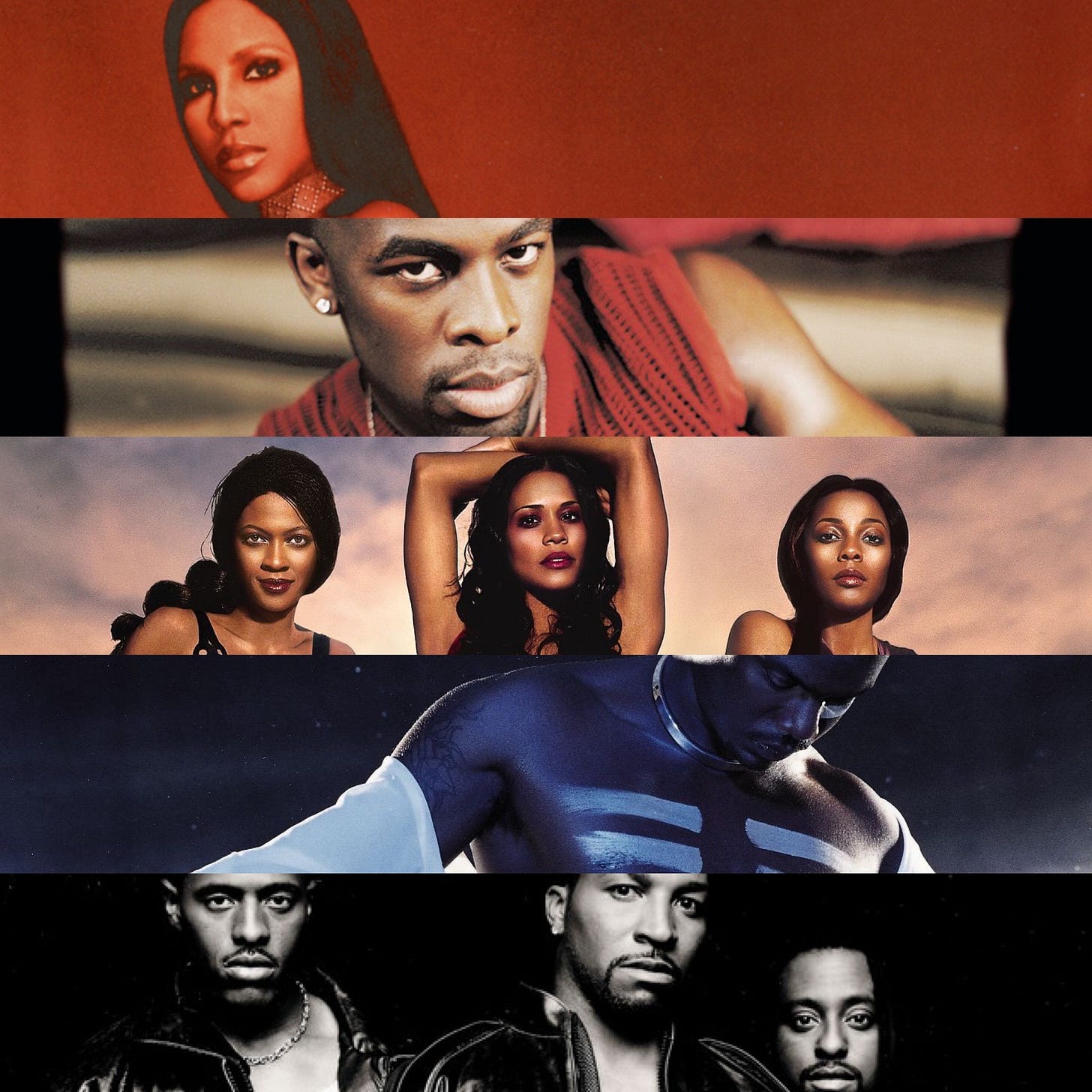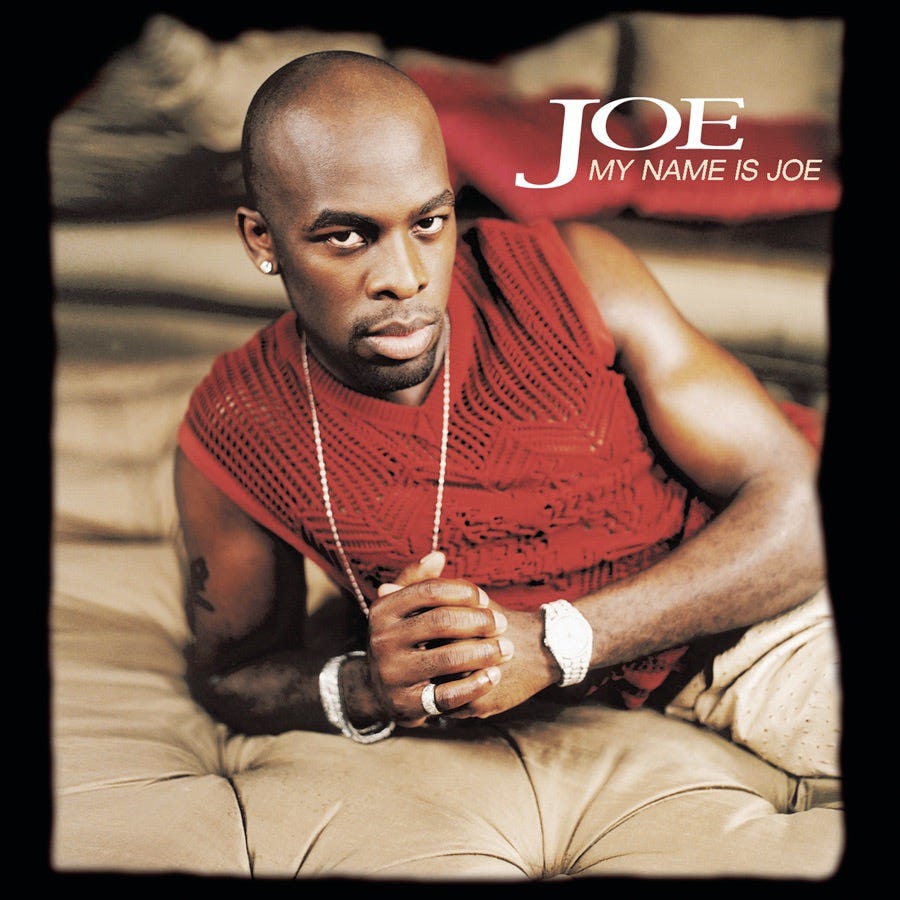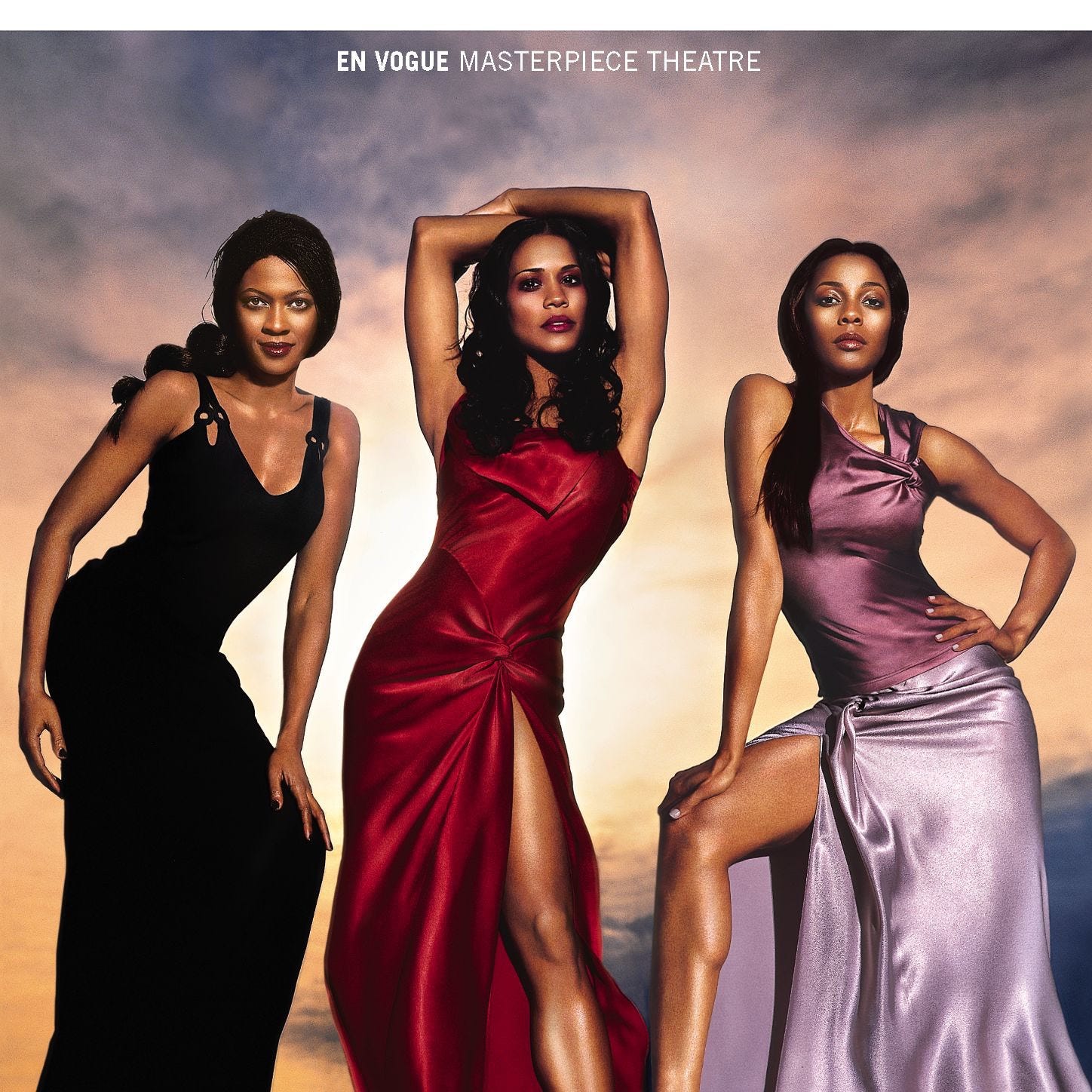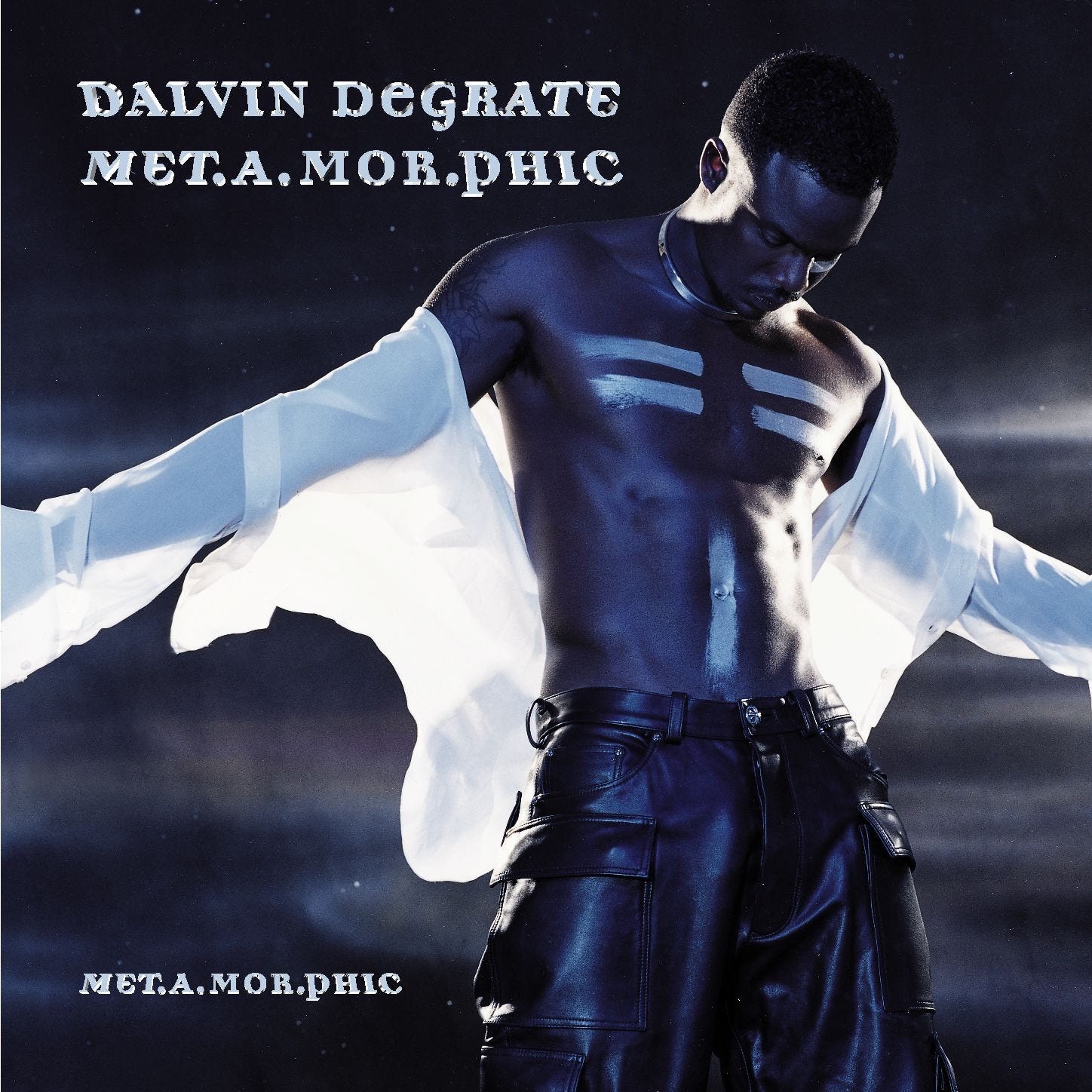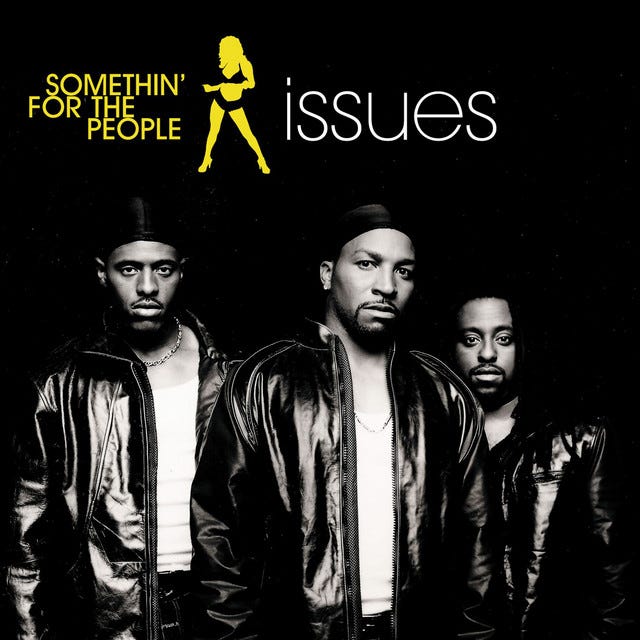Five 2000 R&B Albums That Changed the Temperature
In the shadow of Y2K and Napster, R&B got sleek, grown, and quietly strange. These albums caught that energy before anyone called it nostalgia.
Twenty-five years later, the year 2000 feels like a hinge—R&B standing between analog luxury and digital precision, between the old A&R era and the algorithm’s rise. Five 2000 R&B Albums revisits that crossover moment, when singers, producers, and labels were still negotiating how grown-up soul could live inside a pop machine. The series looks back at that moment through the projects that defined its balance, where records caught between slow jams and singles culture, between the sound of human touch and the pull of technology (even if specific albums aren’t rated highly or are forgotten amid competition).
Toni Braxton, The Heat
While Toni was feeding the tabloids with scandalous stories—semi-nude photos, bankruptcy, and so on—the landscape of R&B was changing dramatically. A wave of young producers had arrived, and with them came a flood of young female singers who could ride their beats with ease. Toni found herself in a delicate position. That anxiety was blown away with the first single, “He Wasn’t Man Enough.” It hit home perfectly. The rhythm might already feel worn out from overexposure, yet Rodney Jerkins’s skill in highlighting Toni’s voice and melody is impressive. He aimed straight for the center—neither too edgy nor too safe—and nailed it.
From there, the album could go in any direction. Track “The Heat”, co-produced by Toni and Keri Lewis of Mint Condition, carries a slight Latin flavor and bridges neatly into “Spanish Guitar”. That “Spanish Guitar” is the obligatory Diane Warren/David Foster song—marketing-wise, essential for the “Un-Break My Heart” Toni image—a solid insurance policy. “Just Be a Man About It” and “Gimme Some” are produced by the Noontime crew—Ted Bishop and Jazzy Pha, respectively. Bishop’s “Just Be a Man About It,” like “Love Affair” from the debut, is a calm, mature song. He also handles “You’ve Been Wrong”, which makes striking use of the Stylistics’ “Stop, Look, Listen to Your Heart” phrase. Both songs glide along with an easy groove that feels good. On “Gimme Some,” Babyface joins as co-writer, with a rap from Left Eye. Like P!nk’s “Split Personality,” it’s a surprisingly dance-oriented track for the usually mellow Babyface. Conversely, “I’m Still Breathing” feels like a quintessential Babyface production, though its rhythmic accents carry a bossa-nova-like sway that’s interesting.
Overall—He Wasn’t Man Enough included—the keyword is mellowness. Every production choice prioritizes showcasing Toni’s vocal ability. That’s consistent, and for her, it’s the right method: don’t tinker too much. “Fairy Tale,” which Toni wrote and played keyboards on herself, is lovely, showing her steady maturation as an artist. The Warren-Foster collaboration “The Art of Love” plays like an answer song to “Breathe Again,” but radiates confidence in who she is now. No matter how modern the rhythm, Toni never changes her singing style. That pride and the refined sensuality of a mature woman flow through the new Toni—and it’s quite something. — Kendra Vale
Joe, My Name Is Joe
A little while back, Joe delivered a stellar performance on the collaboration “Thank God I Found You (Make It Last Remix)” with Mariah Carey (and Nas), which directly borrowed the melody from Keith Sweat’s “Make It Last Forever.” Since his previous release, All That I Am (1997), Joe has never strayed from the forefront of the scene—guesting on the late Big Punisher’s classic “Still Not a Player,” collaborating with Case and Chico DeBarge, producing acts like Men of Vizion and Profyle, and helping lead the male-vocalist revival. Maintaining a loose but steady relationship with his label, Joe stands in perhaps the ideal position in Y2K’s R&B world—poised to keep delivering quality music. Now comes his first album in about two and a half years.
And really—how could it not be good?
Since the huge success of “I Wanna Know,” Joe has continued down the path of the balladeer, and his slow-to-ballad range remains exceptional. On this album, too, he captures attention with supple, warm romantic slow numbers: “Table for Two” and “I Believe in You,” both by Joe & Joshua Thompson; the all-star-produced “So Beautiful”; and “I Believe in You” (Tim & Bob). His vocals sound more relaxed than before, his smooth, embracing tone at its best. The Mariah duet “Thank God I Found You” reminds you that it’s a song only Joe could have made work. Even as he proves himself a superb producer, Joe doesn’t forget to let outside producers play with his sound. On the last album, that meant Rodney Jerkins’s “Don’t Wanna Be a Player.” Here, the equivalent might be “Stutter”—a melodious, Joe-aware, mid-tempo funk track that’s quite well done. The all-star track “Get Crunk Tonight” carries a Timbaland flavor; “So Beautiful” goes for a Rodney-style uptempo; both serve as nice accents. The mellow “Black Hawk” by Steve Huff, sampling Isaac Hayes, also feels right.
Only the first single, “Treat Her Like a Lady,” produced by Teddy Riley, feels a bit restrained—too polite for its own good. It could have used more of Teddy’s trademark spark. And then there’s “Thank God I Found You (Make It Last Remix)”, a sweet, somewhat corny pop ballad featuring *NSYNC. Maybe Joe’s following in R&B’s Voldemort footsteps?
Still, Joe surely knows exactly where he stands. — DeShawn Ellis
En Vogue, Masterpiece Theatre
The image of En Vogue, whose name is derived from the magazine VOGUE, features stylish young women singing and dancing brilliantly on the front stage while striking poses. Dawn Robinson’s departure dealt a greater blow visually than musically. To fill that gap, the remaining members appeared in the video for “Whatever Will Be, Will Be” wearing android-like makeup, crawling on the floor, and even sticking pins into their heads to play Eraserhead. Bringing in Babyface as producer and attempting to break away from their retro image may have been a success, given the impact the video had. Though “Whatever Will Be, Will Be” didn’t quite reach the Top 3 on the charts, the album Masterpiece Theatre ultimately sold over a million copies.
However, their eccentric image change risked blurring the individuality they had built. They could go on even without Dawn. The album Masterpiece Theatre—produced entirely by Foster & McElroy, their creators and mentors—seems intended to reaffirm that being retro draws out their charm and personality best, and is their strongest weapon. It offers a sound that feels as if they’ve returned to their debut days. “No, No, No (Can’t Come Back)”, which plays like a radio broadcasting classical music; Beethoven’s “Moonlight Sonata” appears in “Sad But True”; and then, following another classical piano piece (“Love Won’t Take Me Out”) comes “Those Dogs”, which begins with timpani and string ensemble. Over this bold arrangement, the three members bite into their specialty doo-wop-style chorus and trade off leads. “Riddle,” featuring the rap trio Eklypse, also uses Carmen as its foundation.
There have been past hits sampling classical pieces, but theirs makes one realize that, more than being novel, this approach is the strongest way to let their singing reach even audiences who never listen to Black music. Still, some longtime fans may judge this “strongest weapon” as mere entertainment. Yet the coolness of “Latin Soul” and the warmth felt in “Love U Crazay”—whose guitar and Hammond organ give off a Tony! Toni! Toné-like vibe, which was co-produced by Marlon McClain and Mark Lomax, is a satisfying result. The lead single “Riddle” is fashion-conscious in moderation yet built with En Vogue-like precision, proving that Foster & McElroy’s sensibility hasn’t faded. The songs, seemingly aimed at expanding the market, feel born of the relaxed confidence that comes with a long-standing trust between artist and producer. — Brandon O’Sullivan
Dalvin DeGrate, Met.A.Mor.Phic
Dalvin DeGrate—the man himself, Mr. Dalvin of Jodeci, and younger brother of DeVante Swing. Compared with the Hailey brothers, K-Ci & JoJo, who sing passionately with gospel-bred voices, and DeVante, who created the innovative sounds that fueled the group’s street feel, Dalvin—who joined the group last (and thus is the only one whose name isn’t reflected in the group’s name)—was, I admit, someone I had written off as the least contributing member (forgive me!). Yet here he is, returning before us, looking more robust than ever—it’s impossible not to be surprised. That said, with his Playboy looks, he was, in a sense, the group’s frontman, and it’s also true he crafted cool, stylish tracks like “Get On Up,” showing himself to be a capable sound-maker rivaling DeVante.
In fact, in ‘97, Dalvin secretly left for L.A., concealing his Jodeci background, and there he met Cassandra Mills (the executive producer of this project) and began plotting his solo debut. Later, he successfully signed with Maverick, leading to the release of his debut solo album Met.A.Mor.Phic. The title signifies a “metamorphosis” from Mr. Dalvin to Dalvin DeGrate—essentially, “Look at me, not as Jodeci.” The advance single “Why Can’t We” is a futuristically designed Timbaland-style high-speed uptempo track by Stevie J and Kevin Scott, with a vibe close to what She’kspere crafted for P!nk. Other tracks laid over modern syncopated Timbaland-style beats (perhaps conscious of Ginuwine?) include “I Got That”, self-produced by Dalvin, and “Soft & Wet (Interlude)” and “Not My Girl”, co-produced with Stevie J. Dalvin sings them roughly, with a slightly smoky, K-Ci-like baritone. Undeniably cool. His singing on “Scandalous”—a cool yet somewhat gritty hip-hop-style track using an Al Green sample, with all instruments played by Dalvin himself—is also very K-Ci-like.
The only track produced (and sung) by DeVante, “Long Day”, is another raw-smelling number; its slightly late snare initially feels odd but gradually becomes addictive. The thick bass drag of “More Than Friends” and the layered chorus interplay of “Not My Girl” share that same heavy texture. Once you fall for the fat sound quality running through the whole record and Dalvin’s greasy vocals, there’s no getting out easily. In addition, the Tim & Bob-produced “She Wanted” and “Dangerous” are slow, tender numbers in a Joe-like vein. They’re low-key but rich in flavor. As for the cover of Def Leppard’s 1988 hit “(Something for) Nothing’s Last,” its intent is unclear—but it’s a fine work showing off “the man Dalvin.” — Asa McKenzie
Somethin’ for the People, Issues
In the 1992 film CB4 starring Chris Rock, there was a parody song perfectly done in the style of Public Enemy called “I’m Black, I’m Black, I’m Black.” The ones who created that track were, in fact, Somethin’ for the People. Their remarkable ability to digest and re-work styles has only become more refined now that they’re recording artists themselves. Of course, they’re not innovators. But precisely for that reason, they deliver high-quality songs that serve as ideal samples of the current scene—like the Bar-Kays once did. That was already clear from their previous album, which included a track that sounded unmistakably Erykah Badu-ish, à la “On & On.” Two and a half years after that album, which produced the huge hit “My Love Is the Shhh!” and “All I Do,” what sounds have Sauce, Cat Daddy, and Fuzzy brought us now?
First, the front half is packed with mid-tempo to uptempo numbers. Though the arrangements vary—scratches, strings, and such—the key sonic signature remains a harpsichord-type sound, and their straightforward aim recalls IMx. The model for the album’s first half is clearly Rodney Jerkins, and, as heard in “Days Like This,” which makes you want to call them “the male Destiny’s Child,” also Shakespeare. Since the set strings together songs of a similar, slightly melancholic tone, it risks monotony, but the guest rappers do good work. Especially since Fuzzy’s lead vocals lean soft, Xzibit’s harsh voice provides a fine contrast on “Now U Wanna.” Shaunta on “Take It or Leave It” is the same one who appeared on Montell Jordan’s “Let’s Ride (Remix)” and Timbaland & Magoo’s “Luv 2 Luv U.” Her floating voice adds another lovely accent. “Act Like You Want To.” featuring member Cat Daddy rapping and sisters Trina & Tamara singing the hook cutely, is the best of the first half—their chemistry with Fuzzy is perfect.
But the album’s highlight lies in the slow-jam-filled back half—particularly “You Want This Party Started,” “With You,” and “Can You Feel Me.” Of these, “You Want This Party Started” is a fine, guitar-centered live-sounding ballad where the falsetto shines. After the serious message song “With You” comes “Can You Feel Me,” whose beautiful Stevie Wonder-esque melody (as expected) features Eric Benét. Normally, things would end there—but then comes “Don’t Wanna Break Your Heart,” a slow jam opening with Elton John’s “Bennie & the Jets” piano riff, featuring Luke, a track of chaotic ideas. The section that suddenly doubles tempo and turns bass-heavy seems to borrow from Sammie’s “I Like It” right away; the lyrics even repeat “I like it.” That kind of quick-footedness is great. It may not appeal to those who seek charisma in music, but albums like this are indispensable to keeping the scene healthy, and above all, they’re fun. Unfortunately, this was their last release. — Murffey Zavier


